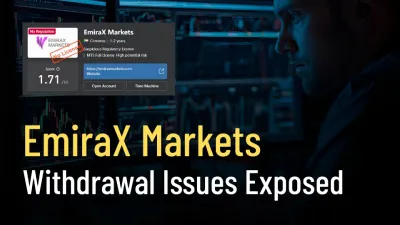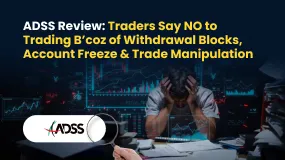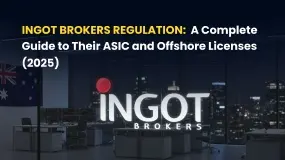简体中文
繁體中文
English
Pусский
日本語
ภาษาไทย
Tiếng Việt
Bahasa Indonesia
Español
हिन्दी
Filippiiniläinen
Français
Deutsch
Português
Türkçe
한국어
العربية
WIKIFX REPORT: Standard Bank announces Africa Trade Barometer
Abstract:Standard Bank has launched Africa Trade Barometer, which is expected to become Africa’s leading trade index.
Standard Bank has launched Africa Trade Barometer, which is expected to become Africas leading trade index.

Philip Myburgh, Head of Trade and Africa-China at Standard Bank, said that present in 20 African markets and supporting trade activities in many more, Standard Bank enjoys a uniquely privileged view of Africa, “especially its rapidly emerging enterprises heavily focused on domestic, cross-border and global trade.”
Trade is deeply rooted in Africas DNA and integral to its history and future development.
As such, Myburgh believes Africa‘s largest bank by assets and so single-mindedly committed to Africa’s growth has a duty to “leverage its privileged position, presence and insight to intelligently inform and grow the continents trade ecosystem.”
Over the long term, rapidly growing markets in East and West Africa and the re-emergence of global growth post Covid-19, currently combine with the broadly ratified African Continental Free Trade Area (AfCFTA) to present considerable opportunity for Africas small, medium, and larger domestic businesses.
Short-term challenges also demand closer coordination.
Current geopolitical volatility only highlights the importance of cross-border and regional African trade.
Food inflation in Africa as well as outright shortages of African staples like wheat underline the urgency of building much closer economic cooperation across the continent.
Trade offers Africa the opportunity to offset supply chain shocks while managing the worst effects of inflation, high interest rates and currency depreciation.
“Since insight is key to leveraging trade to build resilience, our Africa Trade Barometer couldnt be launching at a better time,” added Myburgh.
In a world of disrupted local and global supply chains - and on a continent with significant development and infrastructural challenges - businesses face a daunting array of both new and perennial risks. Understanding and resolving pain points as businesses leverage trade to drive growth in this complex risk and opportunity landscape, requires insight – ideally informed by an on-the-ground presence and proven capability across the continent.
Standard Banks Africa Trade Barometer will focus initially on Angola, Ghana, Kenya, Mozambique, Namibia, Nigeria, South Africa, Uganda, Tanzania and Zambia.
The Barometer, which aims to publish twice a year, currently shares comparative data on trade openness, access to finance, macroeconomic stability, infrastructure, foreign trade, governance, economy and trade finance behaviour.
Qualitative and quantitative intelligence gathered from 2,400 firms representing SMEs, large family businesses, corporates and multinationals across all 10 economies is analysed and then augmented with third-party sources including the World Bank, International Trade Center, and individual country central banks.
The result “presents one of the most comprehensive views of actual trade as experienced on the ground by real African businesses,” said Myburgh.
Trends and analysis gleaned will also provide insight into the broader regions that the 10 study markets represent.
This unique view of African trade will provide a valuable resource for businesspeople, students, governments, NGOs and investors considering the continent – as well as African entrepreneurs - to assess and leverage Africas considerable trade opportunity, currently estimated in the region of $70bn annually.
“We expect the Africa Trade Barometer to become the leading index of African trade trends, activities and developments as Africa‘s small, medium and large businesses define the continent’s next stage of domestic growth and regional and global expansion,” concluded Myburgh.
Disclaimer:
The views in this article only represent the author's personal views, and do not constitute investment advice on this platform. This platform does not guarantee the accuracy, completeness and timeliness of the information in the article, and will not be liable for any loss caused by the use of or reliance on the information in the article.
Read more

Grand Capital Doesn’t Feel GRAND for Traders with Withdrawal Denials & Long Processing Times
The trading environment does not seem that rosy for traders at Grand Capital, a Seychelles-based forex broker. Traders’ requests for withdrawals are alleged to be in the review process for months, making them frustrated and helpless. Despite meeting the guidelines, traders find it hard to withdraw funds, as suggested by their complaints online. What’s also troubling traders are long processing times concerning Grand Capital withdrawals. In this Grand Capital review segment, we have shared some complaints for you to look at. Read on!

EmiraX Markets Withdrawal Issues Exposed
EmiraX Markets Review reveals unregulated status, fake license claims, and withdrawal issues. Stay safe and avoid this broker.

ADSS Review: Traders Say NO to Trading B’coz of Withdrawal Blocks, Account Freeze & Trade Issues
Does ADSS give you plenty of excuses to deny you access to withdrawals? Is your withdrawal request pending for months or years? Do you witness account freezes from the United Arab Emirates-based forex broker? Do you struggle to open and close your forex positions on the ADSS app? Does the customer support service fail to respond to your trading queries? All these issues have become a rage online. In this ADSS Broker review article, we have highlighted actual trader wordings on these issues. Keep reading!

INGOT Brokers Regulation 2025: ASIC vs Offshore License - What Traders Must Know
Explore INGOT Brokers regulation in 2025: Compare their ASIC and Seychelles FSA licenses, understand trader protection levels, and learn about potential risks in this detailed guide.
WikiFX Broker
Latest News
Consob Targets Political Deepfake “Clone Sites” and Unlicensed Platforms in Latest Enforcement Round
WikiEXPO Global Expert Interviews: Gustavo Antonio Montero: ESG in Finance
2 Malaysians Arrested in $1 Million Gold Scam Impersonating Singapore Officials
Is FXPesa Regulated? Real User Reviews & Regulation Check
Fraud Mastermind Zhimin Qian Sentenced to 11 Years for $6.6 Billion Bitcoin Ponzi Scheme
Almahfaza Broker – 2025 Review: Safe or Scam?
Uniglobe Markets Review 2025: A Complete Guide to an Unregulated Broker
INZO Broker No Deposit Bonus: A 2025 Deep Dive into Its Offers and Risks
Exness Broker Expands in South Africa with Cape Town Hub
Global Guide to Finding Forex IBs/Brokers — Share Your Pick and Win Big!
Currency Calculator



